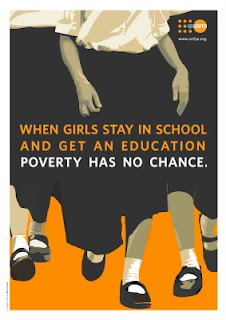-
Strength in Numbers: Can “Girl Power” Save Us From the Financial Crisis?
July 15, 2009 By Meaghan Parker To promote the 20th World Population Day on July 11, the United Nations Population Fund (UNFPA) tied this year’s theme—“Fight Poverty: Educate Girls”—to combating the ongoing financial crisis. It’s a no-brainer that, as UNFPA points out, “women and children in developing countries will bear the brunt of the impact.”
To promote the 20th World Population Day on July 11, the United Nations Population Fund (UNFPA) tied this year’s theme—“Fight Poverty: Educate Girls”—to combating the ongoing financial crisis. It’s a no-brainer that, as UNFPA points out, “women and children in developing countries will bear the brunt of the impact.”But UNFPA takes it a step further, arguing that investments in education and health for women and girls lead to increases in productivity, agricultural yields, and national income. According to UNFPA Executive Director Thoraya Obaid, “an investment in contraceptive services can be recouped four times over—and sometimes dramatically more over the long term—by reducing the need for public spending on health, education and other social services.” Ban Ki-Moon agreed: “There can be no better investment on this day or any other.”
However, I fear this approach will fall on deaf ears, particularly in the United States. World Population Day usually fails to get much U.S. media attention—partly due to its unfortunate timing in the beginning of vacation season—and this year was no exception.
One of the few U.S.-based outlets to mention it at all was the Huffington Post. Contributor and Nike Foundation President Maria Eitel posted some comments on the economic “girl effect” from her colleague Lisa MacCallum, who says that education has “just about everything” to do with population.
Also in HuffPo, CEDPA President Carol Peasley asks the population community to “forge a new consensus” that “improved family planning services enhances development, reduces poverty and reduces environmental stress,” citing the new book The Means of Reproduction, which author Michelle Goldberg recently discussed with Carol Peasley at the Wilson Center.
This year is a banner one for the population community: the 15th anniversary of the International Conference on Population and Development (ICPD) in Cairo, and the 40th anniversary of UNFPA. But according to UNFPA and the World Bank, the financial crisis threatens to reverse some of the gains since the landmark 1994 Cairo conference.
And despite the valiant efforts of UNFPA and others to promote family planning and girls’ education as a key solution, I doubt that the world’s (mostly male) leaders will prioritize girls in the midst of this economic mess.
As WorldWatch’s Robert Engelman observes in the Christian Science Monitor, “Like nearly all other politicians, however, Mr. Obama doesn’t talk about population or its connection to problems from health and education all the way to food, energy security, and climate change. The topic is still too sensitive, despite the recent upsurge in attention.”
Maybe Obama’s actions speak louder: He rescinded the Mexico City policy, increased funding for family planning, and restored U.S. funding for UNFPA. Secretary of State Clinton is a strong advocate, telling the House Foreign Affairs Committee that “we are now an administration that will protect the rights of women, including their rights to reproductive health care.”
However, there is still little push to position population and its links to health and education as a key global issue. Part of the problem may be that the people at USAID and State that would push it are not yet in position; so far, only the assistant secretary for the Bureau of Population, Refugees, and Migration has been confirmed.
In the meantime, women will keep having babies. As Obaid said to the World Bank, “In war or peace, natural or man-made disaster, prosperous economy or financial crisis, women continue to get pregnant…But getting pregnant in the first place can be managed only if women are able to manage their fertility and determine where, when, and how many children to have.”
 A Publication of the Stimson Center.
A Publication of the Stimson Center.

 To promote the 20th World Population Day on July 11, the United Nations Population Fund (UNFPA) tied this year’s theme—
To promote the 20th World Population Day on July 11, the United Nations Population Fund (UNFPA) tied this year’s theme—

